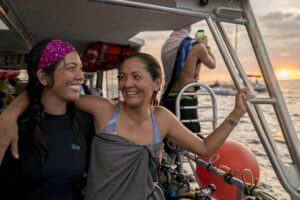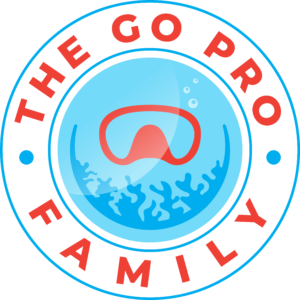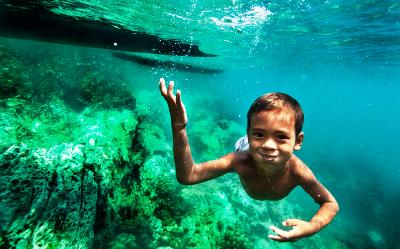Angel & Jo reflect on their latest moves and way of life. How similar are they to the Sea Nomads?
It’s been more than 5 years since I left my previous life in the north of England, and started travelling. In that time travelling has changed so much for me. Now I am no longer “one” and we are “four” and with that comes a whole new way of transporting yourself and your belongings. Gone is the 40 litre backpack and cramped chicken buses, and now we have Trunkies, trollies and toys. And the in-flight entertainment is certainly different with a baby and a 2 year old!
Since leaving the Philippines in April with our meagre bags of worldly possessions, The Go Pro Family has been to Thailand, England, Spain, England again, and then Mexico and this week we have moved into our new home here. Finally we can unpack!
We have a lot to look forward to here in Playa del Carmen, not least our forthcoming IDC, beginning on 5 September.
I don’t know whether it is all this moving around, or whether it was his recent birthday, that caused Angel to have one of his moments of profound reflection – he has these every so often. He started to tell me about the Moken, or “sea gypsies” are they are sometimes known, who he had the chance to meet when he was travelling in Asia.
Who are the Moken?
The Moken, as I have now learnt, are people who inhabit the coasts of Thailand and Burma and use their small boats as homes as well as transportation. They move from island to island with the seasons, fishing using nets and spears. It is even said that their children spend so much of their time diving for food that their eyes adapt to give them better vision underwater. Whatever they catch they either eat or use to barter for other necessities.
Does all this sound familiar? Leaving one island with all your possessions to travel to another destination in the hope of finding a way to continue your lifestyle and feed yourself?
Are scuba instructors the new sea nomads? As one high season draws to a close we move on to the next diving hot spot to find work. Everything we own is stuffed into a backpack and dive bag. Then whenever the work dries up, or we hear stories of awesome diving off the beaten track, we make our way on, usually catching up with old instructor friends along the way.
One of the advantages of the “sea gypsy” lifestyle is the varied cultures which are witnessed and the people you meet and friends you make along the way. If you’re lucky like me you meet a special person and have two kids with them too! There’s a saying that travel is the only thing we spend money on that makes us richer.
As far as Angel is concerned, he has led his semi-nomadic lifestyle for almost ten years, pausing in Mexico in 2006 before returning again now. It is a way of life which he has had to adapt over the years, as the Moken also do, but which has effectively remained the same and is no less enjoyable.
It’s a lifestyle which would not suit a lot of people, but also draws a lot of remarks from friends about how envious they are of our way of life and the places we visit. I know that Angel, as do I, appreciates our roaming life and the freedom that it brings us and our family even though at times it also brings its own difficulties and limitations. I think our son has had a great time growing up in tropical places spending his days in the ocean (and I wouldn’t be surprised if he can also see underwater like the Moken children!)
What is the future for the Moken?
What does the future hold for the Moken people? Their way of life is now threatened, with governments attempting to restrict their movements or, worse still, forcibly settle them as some kind of sad tourist attraction. As their livelihoods (and lives) depend on the fish in the sea, the reduction in fish numbers is also affecting them. More and more Moken children decide to leave behind their traditional lifestyle when the sea can no longer support them and this is threatening the sea gypsies’ very existence.
It seems that the scuba instructors’ survival is more certain than that of the Moken. We are the lucky ones – we choose to make our living from the ocean, whereas for others there is no alternative. Let’s hope that the Moken can continue their journey.
Our lifestyle would not suit a lot of people, but it also draws a lot of remarks from friends about how envious they are of our way of life and the places we visit. I know that Angel, as do I, appreciates our roaming life and the freedom that it brings us and our family even though at times it also brings its own difficulties and limitations. I think our son has had a great time growing up in tropical places spending his days in the ocean (and I wouldn’t be surprised if he can also see underwater like the Moken children!)
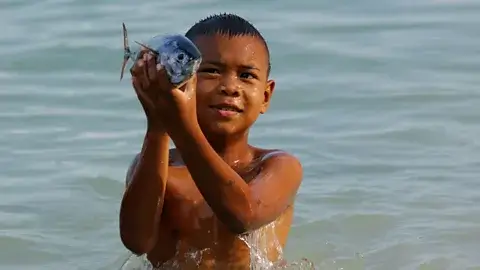
What is the future for the Moken?
What does the future hold for the Moken people? Their way of life is now threatened, with governments attempting to restrict their movements or, worse still, forcibly settle them as some kind of sad tourist attraction. As their livelihoods (and lives) depend on the fish in the sea, the reduction in fish numbers is also affecting them. More and more Moken children decide to leave behind their traditional lifestyle when the sea can no longer support them and this is threatening the sea gypsies’ very existence.
It seems that the scuba instructors’ survival is more certain than that of the Moken. We are the lucky ones – we choose to make our living from the ocean, whereas for others there is no alternative. Let’s hope that the Moken can continue their journey.
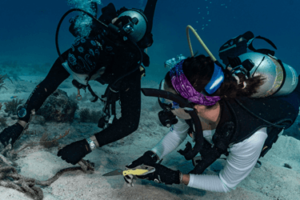
Sustainable Dive Travel: The Go Pro Family’s Efforts to Protect the Ocean
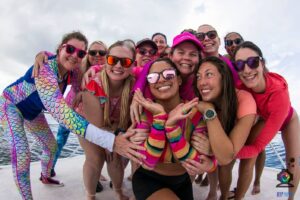
From Challenges to Triumphs: How IDC Graduates Made Waves in Their Scuba Careers
